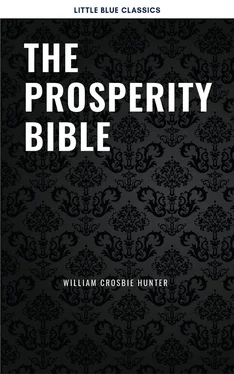Gentlemen, the Spirit of Liberty, the Love of Justice, were early fanned into a flame in my boyish heart. That monument covers the bones of my own kinsfolk; it was their blood which reddened the long, green grass at Lexington. It was my own name which stands chiseled on that stone; the tall captain who marshalled his fellow farmers and mechanics into stern array, and spoke such brave and dangerous words as opened the war of American Independence,—the last to leave the field,—was my father's father. I learned to read out of his Bible, and with a musket he that day captured from the foe, I learned another religious lesson, that "Rebellion to Tyrants is Obedience to God." I keep them both "Sacred to Liberty and the Rights of Mankind," to use them both "In the Sacred Cause of God and my Country."—Theodore Parker.
Narration of Events in General
In this wider, emancipated narration we find much mingling of other forms of discourse, greatly to the advantage of the speech, for this truth cannot be too strongly emphasized: The efficient speaker cuts loose from form for the sake of a big, free effect. The present analyses are for no other purpose than to acquaint you with form—do not allow any such models to hang as a weight about your neck.
The following pure narration of events, from George William Curtis's "Paul Revere's Ride," varies the biographical recital in other parts of his famous oration:
That evening, at ten o'clock, eight hundred British troops, under Lieutenant-Colonel Smith, took boat at the foot of the Common and crossed to the Cambridge shore. Gage thought his secret had been kept, but Lord Percy, who had heard the people say on the Common that the troops would miss their aim, undeceived him. Gage instantly ordered that no one should leave the town. But as the troops crossed the river, Ebenezer Dorr, with a message to Hancock and Adams, was riding over the Neck to Roxbury, and Paul Revere was rowing over the river to Charlestown, having agreed with his friend, Robert Newman, to show lanterns from the belfry of the Old North Church—"One if by land, and two if by sea"—as a signal of the march of the British.
The following, from the same oration, beautifully mingles description with narration:
It was a brilliant night. The winter had been unusually mild, and the spring very forward. The hills were already green. The early grain waved in the fields, and the air was sweet with the blossoming orchards. Already the robins whistled, the bluebirds sang, and the benediction of peace rested upon the landscape. Under the cloudless moon the soldiers silently marched, and Paul Revere swiftly rode, galloping through Medford and West Cambridge, rousing every house as he went spurring for Lexington and Hancock and Adams, and evading the British patrols who had been sent out to stop the news.
In the succeeding extract from another of Mr. Curtis's addresses, we have a free use of allegory as illustration:
THE LEADERSHIP OF EDUCATED MEN
There is a modern English picture which the genius of Hawthorne might have inspired. The painter calls it, "How they met themselves." A man and a woman, haggard and weary, wandering lost in a somber wood, suddenly meet the shadowy figures of a youth and a maid. Some mysterious fascination fixes the gaze and stills the hearts of the wanderers, and their amazement deepens into awe as they gradually recognize themselves as once they were; the soft bloom of youth upon their rounded cheeks, the dewy light of hope in their trusting eyes, exulting confidence in their springing step, themselves blithe and radiant with the glory of the dawn. Today, and here, we meet ourselves. Not to these familiar scenes alone—yonder college-green with its reverend traditions; the halcyon cove of the Seekonk, upon which the memory of Roger Williams broods like a bird of calm; the historic bay, beating forever with the muffled oars of Barton and of Abraham Whipple; here, the humming city of the living; there, the peaceful city of the dead;—not to these only or chiefly do we return, but to ourselves as we once were. It is not the smiling freshmen of the year, it is your own beardless and unwrinkled faces, that are looking from the windows of University Hall and of Hope College. Under the trees upon the hill it is yourselves whom you see walking, full of hopes and dreams, glowing with conscious power, and "nourishing a youth sublime;" and in this familiar temple, which surely has never echoed with eloquence so fervid and inspiring as that of your commencement orations, it is not yonder youths in the galleries who, as they fondly believe, are whispering to yonder maids; it is your younger selves who, in the days that are no more, are murmuring to the fairest mothers and grandmothers of those maids.
Happy the worn and weary man and woman in the picture could they have felt their older eyes still glistening with that earlier light, and their hearts yet beating with undiminished sympathy and aspiration. Happy we, brethren, whatever may have been achieved, whatever left undone, if, returning to the home of our earlier years, we bring with us the illimitable hope, the unchilled resolution, the inextinguishable faith of youth.
–George William Curtis.
QUESTIONS AND EXERCISES
1. Clip from any source ten anecdotes and state what truths they may be used to illustrate.
2. Deliver five of these in your own language, without making any application.
3. From the ten, deliver one so as to make the application before telling the anecdote.
4. Deliver another so as to split the application.
5. Deliver another so as to make the application after the narration.
6. Deliver another in such a way as to make a specific application needless.
7. Give three ways of introducing an anecdote, by saying where you heard it, etc.
8. Deliver an illustration that is not strictly an anecdote, in the style of Curtis's speech on page 259.
9. Deliver an address on any public character, using the forms illustrated in this chapter.
10. Deliver an address on some historical event in the same manner.
11. Explain how the sympathies and viewpoint of the speaker will color an anecdote, a biography, or a historical account.
12. Illustrate how the same anecdote, or a section of a historical address, may be given two different effects by personal prejudice.
13. What would be the effect of shifting the viewpoint in the midst of a narration?
14. What is the danger of using too much humor in an address? Too much pathos?
22
INFLUENCING BY SUGGESTION
Sometimes the feeling that a given way of looking at things is undoubtedly correct prevents the mind from thinking at all… . In view of the hindrances which certain kinds or degrees of feeling throw into the way of thinking, it might be inferred that the thinker must suppress the element of feeling in the inner life. No greater mistake could be made. If the Creator endowed man with the power to think, to feel, and to will, these several activities of the mind are not designed to be in conflict, and so long as any one of them is not perverted or allowed to run to excess, it necessarily aids and strengthens the others in their normal functions.
—Nathan C. Schaeffer,
Thinking and Learning to Think .
When we weigh, compare, and decide upon the value of any given ideas, we reason; when an idea produces in us an opinion or an action, without first being subjected to deliberation, we are moved by suggestion.
Man was formerly thought to be a reasoning animal, basing his actions on the conclusions of natural logic. It was supposed that before forming an opinion or deciding on a course of conduct he weighed at least some of the reasons for and against the matter, and performed a more or less simple process of reasoning. But modern research has shown that quite the opposite is true. Most of our opinions and actions are not based upon conscious reasoning, but are the result of suggestion. In fact, some authorities declare that an act of pure reasoning is very rare in the average mind. Momentous decisions are made, far-reaching actions are determined upon, primarily by the force of suggestion.
Читать дальше












